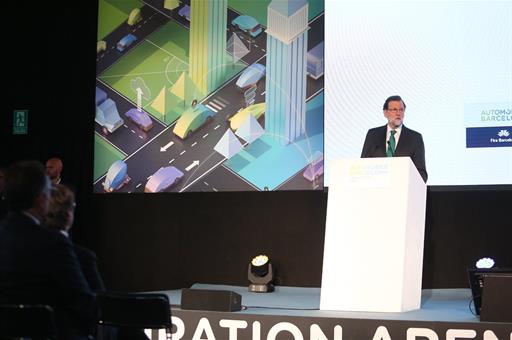Fira de Barcelona, Montjuic, Barcelona
The President of the Government remarked that at the 'Connected Hub' Congress, one of the events that makes up Automobile Barcelona (the new name for the International Motor Show), it was possible to observe that the automotive sector is heading up the two main current technological revolutions: on the one hand, the energy revolution, with the electric vehicle; and on the other hand, the digital revolution, with a connected and automated vehicle.
Spain, he claimed, is a country "closely identified" with the world of motor vehicles which, in addition to their great economic impact, have "an extraordinary social repercussion".
For the President of the Government, the province of Barcelona is exemplary in this regard, "because people from all over Spain came here to seek out new opportunities and, in passing, helped convert this city into one of the capitals of the motor industry and enrich a plural and open society as is Catalonia".
Innovation, strategic area
In turn, Mariano Rajoy thanked the automotive industry for committing to Spain which, with 17 factories distributed around the whole country, is one of the world's major car manufacturers.
Pool MoncloaThe automotive sector, he specified, represents 9% of Spanish industrial GDP and its investment plans amount to 10 billion euros in total, of which 6 billion have already been made. "Investments have been made in many parts of our country, including here in Barcelona, the unrivalled capital of a prosperous Catalonia in a thriving Spain that is firmly anchored in a modern and competitive Europe".
The current challenge, stressed the President of the Government, is to convert Spain "into a power of the first order" in the future of car manufacturing. In this regard, he underlined "the government's firm commitment to such a strategic area as innovation in automobiles".
Overcoming barriers
Mariano Rajoy also referred to the technological revolution in other economic sectors. According to a recent report drafted by the European Commission, digitalisation requires improving the know-how of workers in new technologies; if these capabilities are not extended, more than 825,000 jobs will remain vacant due to under qualification by the year 2020.
"The future", argued the President of the Government "require innovation and connection", "overcoming barriers and sharing", as illustrated by this "extraordinary joint project" that is the European Union. In his opinion, "in order to compete in a global world and increase the well-being of our citizens, we must avoid any temptation to disconnect and isolate ourselves".
As evidence of the government's support for these efforts to innovate, the President of the Government stressed that the draft General State Budget increases the financial provision for programmes to support industrial investment and development, as well as the manufacture and purchase of alternative energy vehicles. The system of tax deductions for R&D+i, he added, "will remain one of the most favourable systems in the world". In total, he concluded, the Budget for 2017 will see an increase of more than 4% in the heading of R&D+i.
Strong recovery
Pool MoncloaMariano Rajoy recalled that when he took part in the same forum two years ago "Spain had barely started to take its first steps down the path to recovery", while today we can say that "our pace has picked up greatly". In this regard, he pointed out that the government has just revised the economic growth forecast for the year up to 2.7%, because in the first quarter of the year alone, the country has grown by 0.8%, "at a rate that is more than double the average for our European partners".
"We have managed to recover over 60% of the jobs shed during the crisis through the creation of almost 2 million jobs and Spain heads up the unemployment reduction figures in the Eurozone", underlined the President of the Government.
Mariano Rajoy stressed that "job creation remains the absolute priority of this government" and that the goal is to see 20 million people in work by the year 2020. "We can achieve this if we continue down the path of sensible policies, stability and reforms. Stability and moderation are beneficial for everyone".
The automotive industry has clearly played its role
The President of the Government underlined that, in terms of employment, "the automotive sector has clearly played its role", because during the tough years, between 2013 and 2015, car manufacturing factories created 6,000 new "stable, quality" jobs. He also highlighted the positive effect of this industry on the economic fabric, since Spain exports 85% of all vehicles manufactured (2.4 million). This means that the automotive sector represents 18% of all exports, he pointed out.
On this point, the President of the Government stressed that exports have been a decisive factor in the economic recovery, with four straight years in positive figures, to which should be added the positive figures for 2017 to date.
Mariano Rajoy also pointed out that sales increased by 11% from 2015 to 2016 and that it is expected that 3 million vehicles will be manufactured this year.
In order to continue along this path, Mariano Rajoy announced that "the government will do all it can to back this boom by modernising ports and logistics platforms, and through investments" such as the Mediterranean Corridor. It will also commit to boosting the industrial fabric, improving the energy framework and Vocational Training tied to companies.
Following the closing event, Mariano Rajoy visited the installations of Automobile Barcelona, accompanied by the Minister for Public Works, Íñigo de la Serna.





